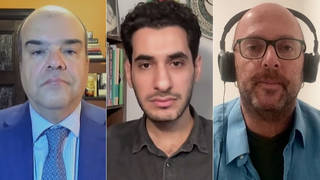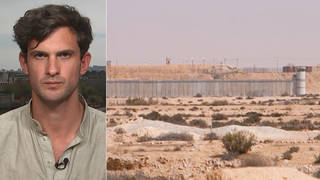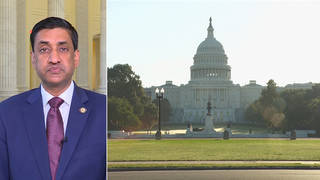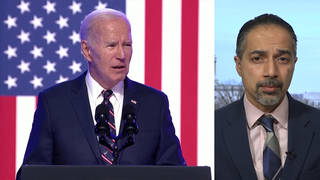
Topics
Guests
- Trita Parsiauthor and analyst who serves as executive vice president of the Quincy Institute for Responsible Statecraft.
In an escalation of tensions, the Biden administration has deployed thousands of U.S. Marines and sailors to the Middle East in order to deter Iran from seizing oil tankers and other commercial ships near the Strait of Hormuz. The move comes after the Navy said Iran tried to seize two commercial oil tankers in the Gulf of Oman last month, after seizing dozens more since 2019. Iran responded by equipping its Navy with drones and missiles. “It’s really baffling to see why we’re taking such immense risks that could bring the U.S. into war for achieving things that are of little value when it comes to peace and stability in the region or U.S. interests in the region,” says Trita Parsi, executive vice president of the Quincy Institute for Responsible Statecraft, who says the Biden administration is risking a new war for stronger relations with Saudi Arabia. He argues the Biden administration has made critical mistakes in its relations with Iran by continuing Trump administration-era maximum-pressure sanctions.
Transcript
AMY GOODMAN: The Biden administration has deployed thousands of U.S. Marines and sailors in the Middle East in order to deter Iran from seizing oil tankers and other commercial ships near the Strait of Hormuz. U.S. forces arrived Sunday and could be stationed on interested ships in what The Washington Post called a “remarkable escalation” of tensions between the two nations.
The move comes after the Navy said Iran tried to seize two commercial oil tankers in the Gulf of Oman last month and reportedly opened fire on one of tankers. The U.S. said Iran also seized two merchant ships in May and dozens more since 2019. The U.S. Naval Forces Central Command called Iran’s actions a, quote, “threat to maritime security and the global economy.”
This is what White House spokesperson John Kirby said on Iran on CNN.
JOHN KIRBY: We have seen a real increase now in their attempted attacks or, in some cases, sadly, successful attacks on maritime shipping in and around the Strait of Hormuz, whether it’s outside the Gulf or just inside the Gulf. And this is activity that we’ve seen spike from the Iranians before, certainly spiking now, and we’re sending a strong message, not just to Iran but to our allies and partners, that we take this seriously, because so much, particularly oil, so much of that flows through the Strait of Hormuz. That’s a chokepoint for the Middle East that has global trade implications. We’ve got to make sure that we can defend our interests and the interests of our allies and partners. That’s what these deployments — that’s what they’re all about.
AMY GOODMAN: Meanwhile, Iran has said the ships it detained committed various violations and that at least one ship had issued a distress signal that it was responding to. On Saturday, Iran said it has now equipped its Revolutionary Guards Navy with drones and missiles. This is Iran’s Navy commander speaking on state TV.
ALIREZA TANGSIRI: [translated] These missiles can follow multiple targets, accept commands when they are launched and change their target along the way.
AMY GOODMAN: For more, we’re joined in Washington, D.C., by Trita Parsi, executive vice president of the Quincy Institute for Responsible Statecraft, author of several books, including Losing an Enemy: Obama, Iran, and the Triumph of Diplomacy. His current column for Responsible Statecraft is headlined “With Marines on Persian Gulf vessels, is Biden risking war with Iran?”
Welcome back to Democracy Now!, Trita. Well, maybe you can answer that question for us. Lay out what led to what the U.S. is doing, and how Iran is responding and what you’re so concerned about.
TRITA PARSI: Well, this is extremely concerning, and there’s a reason why The Washington Post characterized this latest potential move by the Biden administration as a “remarkable escalation.” It is because it is a remarkable escalation and that does risk leading the two countries into war.
The Iranians taking some of these ships in the Gulf of Oman and the Persian Gulf is, without a doubt, a problem that needs to be addressed, but the root of this problem is that the Biden administration has continued Trump’s maximum-pressure strategy on Iran and has been confiscating vessels with Iranian oil, saying that this is the implementation of U.S. sanctions. But U.S. sanctions and U.S. laws do not apply to international waters. And as a result, the maritime security of the Persian Gulf has been threatened by these actions and by the response of the Iranians.
If we truly want this to end, the easiest way is to stop confiscating the Iranian oil. And that way, there will be no reason for the Iranians to do what they have been doing. And they have not been doing this unless there has been any measures by the U.S. in this direction. But by putting these Marines on commercial vessels — this has not happened since the previous century during the World Wars, and that was during wartime. So that is a reason as to why The Washington Post is characterizing this as a “remarkable escalation.”
AMY GOODMAN: The Washington Post also reports, “Other recent steps to deter Iran include the deployment of advanced F-35 jets, along with other fighter aircraft and A-10 attack jets, to the Persian Gulf region.” Your response?
TRITA PARSI: Yeah. What we’re seeing here, which is quite concerning, is that despite all of the promises that there would be lesser U.S. military presence in the Persian Gulf and in the Middle East, bringing the troops home, we’re now seeing the Biden administration moving more troops into the region, betting on deterrence rather than actually a deescalation of the situation.
And part of the reason why the administration is doing this is because of its key priority in the Middle East right now, which is to get Saudi Arabia to normalize relations with Israel. In order to do so, the Saudis have asked for a defense pact with the United States, something that Biden so far has been reluctant to offer, because it would mean that the United States would have to sacrifice its servicemen and women for the defense of the Saudi dictatorship. But in order to meet them halfway, it appears that the administration is calculating that by moving more troops to the region, by demonstrating that it is willing to go into conflict with Iran, that that will make the Saudis more comfortable that the United States will come to their defense even in the absence of an official security pact.
And the question we have to ask ourselves: All of this for what? Because getting the Saudis to normalize relations with Israel, at a time when the Israelis have the most extremist government in their entire history — the annexation of Palestinian territory, the impossibility of actually making peace between Israel and Palestinians because of the policies of the Israeli government currently — to have that normalization take place in that context would be an American endorsement of what the Israeli government currently is doing in terms of undermining any prospect for peace. So it’s really baffling to see why we’re taking such immense risks, that could bring the U.S. into war, for achieving things that are of little value when it comes to peace and stability in the region or U.S. interests in the region.
AMY GOODMAN: Trita Parsi, you also have the potential for the Iranians to use a water drone to take out a tanker, the significance of American soldiers potentially drifting into Iranian waters — what all this could mean?
TRITA PARSI: Yes. One scenario that I’m not sure the White House has taken fully into account is, instead of the Iranians going after some of these commercial vessels in the manner that they have done so far, they may use a drone to take out the engine and then let the ship drift into Iranian waters. At that point, you would have 20 or so U.S. Marines in Iranian waters. The Iranians would confiscate those ships, probably deter the American soldiers. And that would be probably the biggest crisis that the Biden administration has faced.
You know, this did happen by accident in 2016, when some American sailors accidentally veered into Iranian waters because of navigation and engine problems. That was resolved in 16 hours because the JCPA was in place, because the Obama administration had established a good channel of communication with the Iranians. And as a result, most Americans don’t even know about this, because it was resolved so quickly. Biden has done none of this, and as a result, if this scenario were to take place, it would lead to a major crisis and a potential point of military confrontation between the two countries.
AMY GOODMAN: You write, “It is impressive how MBS” — Mohammed bin [Salman], the head of Saudi Arabia, essentially — “It is impressive how MBS has played Biden.” Explain.
TRITA PARSI: Well, if you take a look at what’s happening during the Biden administration, Biden came in promising that he’s going to turn — show the world the pariah that Saudi Arabia is, is going to take a tougher stance, that he’s going to end the war in Yemen — many, many different promises that were made. But instead, we’ve seen MBS, the crown prince of Saudi Arabia, play tough ball with the Biden administration; raise oil prices, at a moment that was really crucial to the U.S. for prices to go down; push back really hard; make a deal with the Iranians through the Chinese — all of these different measures. And all we’ve seen from the Biden administration is to pursue a softer and softer approach towards Saudi Arabia, including now even considering some form of a security arrangement with the Saudis in return for this normalization.
It seems to me that this obsession of getting a Saudi-Israeli normalization, which, again, has questionable value, is the leading star of the administration. And as a result, they’re willing to go to great lengths and great concessions to Saudi Arabia in order to achieve this. And it’s not even clear whether MBS is really going to go for it at the end of the day. The just dangling of that opportunity is getting him massive concessions from the U.S. side.
AMY GOODMAN: We’re coming up on the first anniversary of the protests for justice for Mahsa Amini, the young Kurdish Iranian woman who was — who died at the hands of the so-called morality police, her death sparking massive protests not only in Iran, but around the world. Do you think U.S. antagonism towards Iran will actually embolden Iranian leaders to be more violent and repressive as, we understand, they are preparing for a new crackdown on the people?
TRITA PARSI: I think, in the larger context, greater tensions between the United States and Iran have been to the detriment of the pro-democracy movement in Iran. Their ability to be able to pursue the changes that they are seeking is all the more difficult when there’s high tensions between the two countries. But in this specific instance, in the short tactical term, I doubt that the impact is going to be particularly significant. The government there has been extremely brutal in its clampdown of protesters. And even though I think that there’s a likelihood that there will be new protests taking place on the anniversary, because the anger of the population is still there — there’s been nothing that has really systematically changed in the country in terms of addressing some of the root causes of this — nevertheless, the repression is likely going to be very intense.
And if you take a look at this over the longer term, what we have seen is that when countries are under the type of broad-based economic sanctions that Iran is under, and countries like Cuba, Venezuela, Zimbabwe and others have been under, the long-term effect is that the governments tend to become far more repressive than they were before, because in order to keep control and stay in power and control the anger of the population, they resort to more and more repression. And the instances in which we have — in which these type of broad-based sanctions eventually lead to democratization are, essentially, very few. There’s only one example. It’s South Africa. In all other cases, these type of broad-based sanctions have actually led to a situation in which the population is more repressed, because the government becomes more repressive, more aggressive, including more aggressive on the foreign policy arena, as well.
AMY GOODMAN: We just have 30 seconds, Trita, but what do you think should happen now, as Biden makes this move? I mean, he was Obama’s vice president, but do you think his policy on Iran, despite what he said leading up to the election, is more like Trump’s?
TRITA PARSI: Well, in certain aspects, you know, he is continuing the maximum-pressure strategy. I think the administration did try diplomacy with Iran in negotiations. And certainly, the Iranians have created a massive amount of problems in that process. But I think there was a key mistake the administration did in the beginning, which was it didn’t go back into the agreement right away through an executive order, as it did, for instance, with the Paris Agreement, with WTO. Instead, it chose a negotiated path, and it used the Trump sanctions as leverage for that. And I think that has been a critical mistake that has led to several consequences, including the ones that we’re seeing right now.
AMY GOODMAN: Trita Parsi, I want to thank you for being with us, executive vice president, Quincy Institute for Responsible Statecraft. We’ll link to your column, “With Marines on Persian Gulf vessels, is Biden risking war with Iran?”
Next up, an update on the U.S. response to asylum seekers, from the southern border in Texas, where state troopers are separating migrant families, to New York City. Stay with us.












Media Options